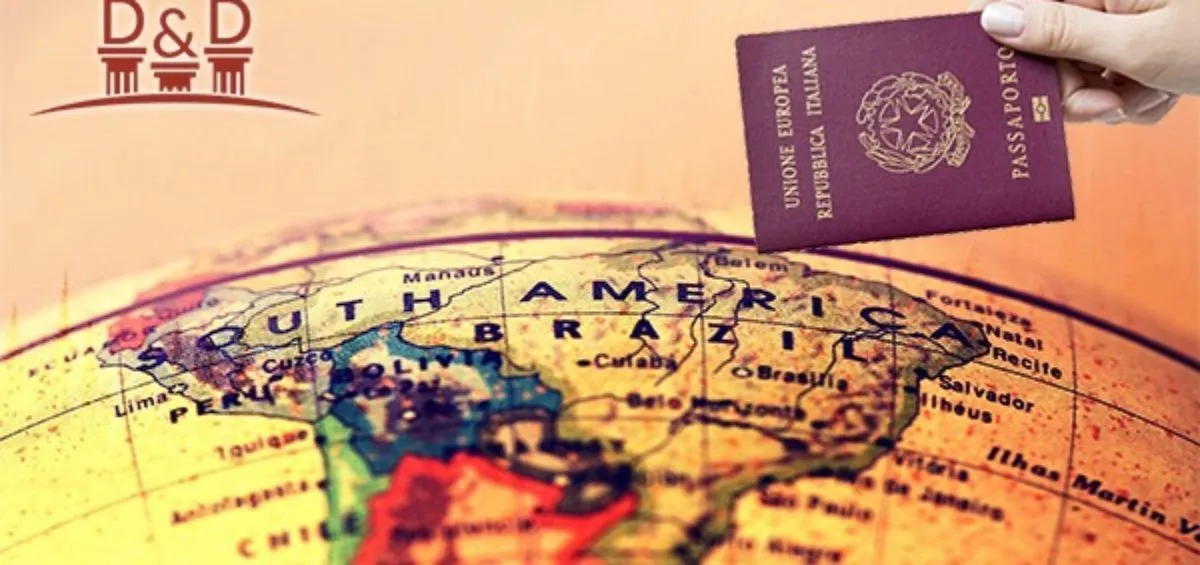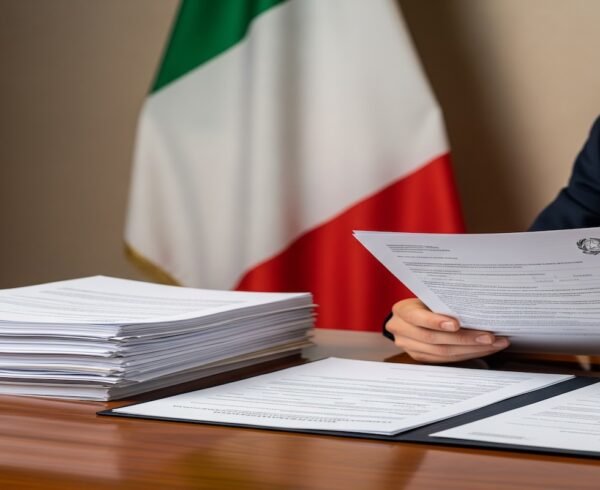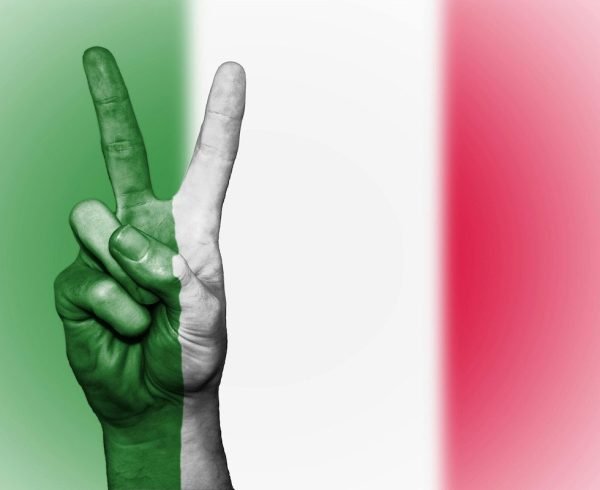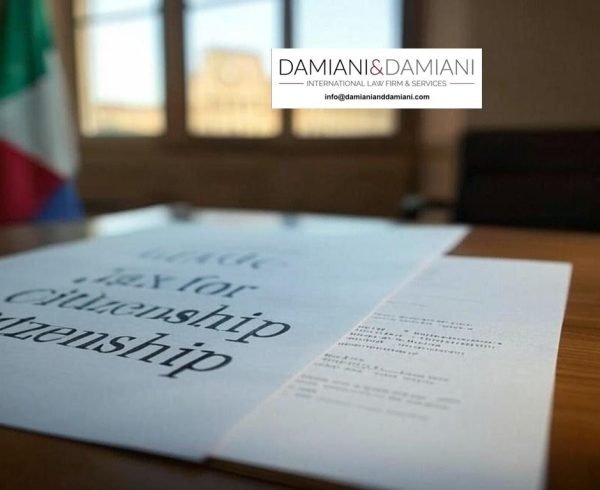Updated September 2025. Italian Citizenship by descent via Judicial Process
Requirements for Italian Citizenship Recognition Iure Sanguinis. Request to Consulates and Italian Citizenship loophole
Citizenship by descent also applies to foreign descendants of an Italian citizen who emigrated abroad after 1861. To obtain Italian citizenship iure sanguinis, one must demonstrate to the consulate an uninterrupted descent from an Italian emigrant (uninterrupted lineage), by providing the necessary documents (documents for iure sanguinis citizenship recognition). You are entitled to Italian citizenship and a passport iure sanguinis if the emigrated ancestor from whom you descend (male or female) generated offspring while still an Italian citizen. Moreover, it is now easier to apply for Italian citizenship iure sanguinis, thanks to a ruling by the Italian Supreme Court that has revolutionized the procedures for recognizing the citizenship rights of foreign citizens of Italian descent.
The new Italian citizenship ruling
The recent interpretative changes introduced by the Court of Cassation and implemented in Circular No. 43347 of October 3, 2024 represent a turning point for descendants of Italian emigrants seeking to obtain Italian citizenship by descent (iure sanguinis). This new interpretation of Law 555 of 1912 clarifies the conditions under which the transmission of Italian citizenship can be interrupted and, in some cases, restored.
According to the updated guidelines, an Italian citizen who has lost citizenship due to naturalization in another country also passes this loss on to his or her minor children living with him or her. This principle also applies to children born in countries such as the United States, where the right of the soil (jus soli) guarantees local citizenship at birth.
However, if the ancestor who lost Italian citizenship subsequently reacquired it upon reaching the age of majority, the right to the transmission of citizenship can be restored, provided this occurs before the birth of the direct descendant.
This new interpretation is particularly relevant for cases brought before Italian courts, where judges can now recognize the right to citizenship even in complex situations.
The Problem of Waiting Times in reclaiming Italian Citizenship Request Lists at Italian Consulates
Italian consulates create waiting lists for citizenship applications by descent (iure sanguinis). Eligible individuals can apply for citizenship recognition at the Italian embassy or consulate in their country of residence, whose offices will carry out the necessary verifications and procedures to grant citizenship. However, since 2001, this procedure has become increasingly difficult, with waiting lists going as far back as 2005. Lawyers and law firms specializing in citizenship and immigration rights have developed strategies to protect the right to iure sanguinis citizenship. By law, the Italian Administration must respond within two years to those who submit an application, having a legitimate interest in having a subjective right recognized. Furthermore, consulates often do not allow the filing of applications, despite the right to present them.
Reconstruction of Italian Citizenship by descent with lawyer Through Judicial Means
Until 1948, Italian citizenship could only be transmitted through the paternal line. So, for example, if an emigrant ancestor had a daughter who married a citizen of another country before 1948 (Brazil, Argentina, United States, Canada, Australia), their descendants were not recognized as Italian citizens. However, in 1948, the Italian Constitution granted women the same rights as men. Therefore, it is now possible to reconstruct citizenship by maternal descent through judicial means, even for descendants before 1948. In this case, an appeal must be filed with the ordinary civil court in Rome. The court appeal is also used to claim the right to citizenship by descent, thus bypassing the bureaucratic delays of consulates. Moreover, relatives with the same right can be included in the same court proceeding.
Italian Citizenship loophole. Judicial Appeal for Italian Citizenship at the Civil Court in Italy
As mentioned, to reconstruct maternal lineage before 1948, it is necessary to appeal to the Civil Court of Rome. However, it is possible to appeal to the Civil Court of Rome in three other situations:
- When it can be shown that, based on the number of applications the Consulate is handling, it would take more than two years to obtain citizenship recognition.
- When it can be demonstrated that the Consulate did not accept the application to be placed on the waiting list.
- When the request for Italian citizenship has been denied.
Another reason to appeal through the courts is to protect a legitimate interest in cases where the two-year deadline from the application submission has been violated or in the case of an unlawful rejection. In this case, the appeal is filed before the Regional Administrative Court (TAR) of Lazio.
Path to italian citizenship. Becoming an Italian Citizen Iure Sanguinis in Italy
If you meet the requirements for obtaining an entry visa, or if you can enter Italy without a visa for a period of 90 days, it is possible to apply for citizenship directly in Italy, submitting the necessary documentation and then requesting a change of residence. Indeed, the application for citizenship recognition entitles you to obtain a residence permit to live in Italy.
2025 Legal Update – Reform of Italian Citizenship by Descent (Law 74/2025) & Key Constitutional Court Ruling (Decision No. 142/2025)
On March 28, 2025, the Italian government enacted Decree-Law No. 36/2025 (commonly referred to as the “Tajani Decree”), which was converted into permanent Law No. 74/2025 by Parliament on May 23, 2025, entering into force the following day. The reform introduced a stringent two-generation limit: only individuals with a parent or grandparent born in Italy are now eligible for automatic recognition of citizenship by descent (jure sanguinis). This significant change effectively ended the previous unlimited transmission regime, which had allowed claims based only on ancestral links after 1861 :contentReference[oaicite:1]{index=1}.
Key provisions include:
- Application cutoff: Applications submitted (consularly or judicially) by March 28, 2025, 11:59 p.m. Rome time remain subject to the previous rules
- Generational limit: Eligibility is restricted to descendants within two generations—i.e., child or grandchild of an Italian-born ancestor :contentReference
- Exclusive citizenship requirement: The ancestor must have held only Italian citizenship at the relevant time :contentReference
- Residency clause for parents: If the citizenship is acquired (not by birth), the parent must have resided in Italy for at least two consecutive years before the applicant’s birth/adoption
Constitutional Court Decision No. 142/2025 (July 31, 2025):
However, the Italian Constitutional Court ruled that Law No. 91/1992—governing citizenship by descent without generational limits—does not violate the Italian Constitution. The Court dismissed constitutional challenges initiated by various tribunals (e.g., Rome, Milan, Florence, Bologna), which had suspended hundreds of pending citizenship proceedings due to alleged constitutional concerns tied to EU “genuine link” requirements. The Court firmly declared that “blood” (i.e., lineage) constitutes a genuine link to Italy and criticized the tribunals for attempting to impose restrictions through judicial interpretation—calling such maneuvering “manipulative” and unfounded, especially given the widespread impact on citizens :contentReference[oaicite:6]{index=6}.
This landmark ruling reinforces that citizenship by descent under Law 91/1992 remains valid and constitutionally protected. While the new reform (Law 74/2025) stands, its application is limited to future claims—applications under the prior system are safeguarded :contentReference[oaicite:7]{index=7}.
Damiani & Damiani Law Firm viewed this decision as the first stride toward justice for those victimized in recent years by unwarranted restrictions—a push driven by xenophobic overtones rather than legal necessity. We now anticipate a further ruling—should one emerge—that might also declare parts of Decree-Law No. 36/2025 unconstitutional, particularly its retroactive effects. Such a decision would restore equity and resume equitable legal advocacy for citizens’ rights.
Why Apply for Italian Citizenship by Descent?
- Access to EU Citizenship: As an Italian citizen, you gain a full European Union passport, granting the right to live, work, study, and travel freely across EU member states—without visa restrictions. You’ll also benefit from public medical care, education, and cultural exchange programs like Erasmus.
- Secure the Right for Your Children: Italian citizenship can be passed automatically to children under 18, helping to safeguard your family’s ties to Europe
- Establish Cultural Identity & Voting Rights: Being recognized as an Italian citizen strengthens your connection to heritage and grants you the right to vote in Italian elections
Practical Guide: How to Apply
Start by gathering essential documentation: birth, marriage, death, and naturalization records tracing back to your Italian ancestor. In many countries, applying to the consulate remains the standard route.
However, if your claim involves a maternal ancestor born before 1948 or other exceptional circumstances, or for to beat the waiting lists at the consulate, pursuing recognition via the Italian courts may be necessary.
Note: Since March 2025, consular application fees have increased—from €300 to approximately €600 per adult applicant
Finally, if your application was submitted before March 28, 2025, ensure that it’s clear whether it will be assessed under the prior rules—or if new eligibility limits apply to your case
FAQ: Italian Citizenship by Descent (Judicial & Consular Routes)
1. What is the judicial loophole for claiming Italian citizenship by descent?
The “judicial loophole” refers to applying for Italian citizenship via an Italian court when the consular route is impractical or blocked. This path is often used in cases involving:
- Maternal-line descendants born before 1948 (who face restrictions under pre-constitutional laws)
- Administrative delays or inability to secure a consular appointment
- Rejection of applications seen as legally questionable
Courts frequently rule in favour of applicants, recognizing jure sanguinis despite such obstacles.
2. How does the judicial route differ from the consular route for Italian citizenship?
| Route | Description |
|---|---|
| Consular | Submit your application at the nearest Italian consulate. Usual route, but subject to appointment availability, strict documentation rules, and limitations—especially for maternal or retroactive cases. |
| Judicial | File a legal claim before an Italian civil court. The court examines your documentation and, if valid, issues a judgment recognizing Italian citizenship. Particularly useful for complex cases (e.g., pre-1948 maternal lines or generational limit challenges). |
3. Which courts handle citizenship by descent cases in Italy?
Various Italian civil courts (Tribunali) including those in Venice, Rome, Florence, and others, can adjudicate jure sanguinis claims when the consular path is blocked. Hundreds of proceedings were paused after judges raised constitutional questions about the old law, pending rulings.
4. Is there a generational limit for Italian citizenship by descent after the 2025 law?
Yes. Law 74/2025, effective May 24, 2025, restricts automatic citizenship to descendants within two generations—so only children or grandchildren of Italian-born individuals qualify. Claims via great-grandparents are now excluded.
5. Can I still pursue citizenship if I applied before the reform?
If your application was submitted by March 28, 2025 (11:59 p.m. Rome time), it is evaluated under the old, more permissive framework—potentially allowing broader ancestral claims.
6. What recent court rulings affect Italian citizenship by descent?
A landmark judgment by the Constitutional Court (Decision No. 142/2025, July 31) rejected all constitutional challenges to the previous law (L. 91/1992), reaffirming that descent by blood constitutes a valid “genuine link”. The Court criticized tribunals for suspending many cases and declared generational limits imposed through judicial misinterpretation as unfounded. (The Washington Post)
7. What to do if the consulate delays the citizenship application?
If you’re unable to secure a consular appointment within a reasonable time—especially if the wait exceeds 2 years—you may be eligible to file a claim in court. This is often justified by administrative delay and the right to judicial remedy.














